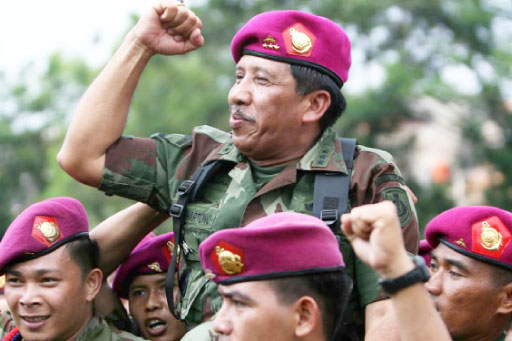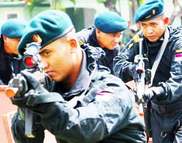CONTINUATION OF Partners in crime
|
themselves from a mix of legal and illegal business activities that raise an estimated $6.4 billion a year, as against their funding from the Government budget of only $3.2 billion. TNI-controlled "charitable foundations" run 64 companies in everything from shopping centres to airlines to logging, while the army, navy and air force have their own empires. But by far the most lucrative are protection payments paid by private enterprises, from huge resource companies down to criminals behind gambling, drugs and prostitution.
This wasn't such a security problem until Soeharto's fall. Since then, the military's grip on its cash flow has been challenged from other quarters. The police, previously run as the fourth branch of the armed forces, were taken out of the Defence Department and put under civilian control two years ago. While the military have been left with their network of domestic garrisons known as the Territorial Command structure, a new law also gives the police responsibility for internal security - without extra funding or resources. Another major change has been the devolution of political authority from Jakarta to the 30 provinces and 400 local governments, which have gained direct access to much of the tax revenue from mining and timber. Alongside the power and funds, corruption and extortion have also been decentralised. The result is that police and army units are now fighting for control of protection rackets and other sources of income across the country. Last month, at Binjai in North Sumatra, an army airborne unit tied up its officers and attacked two local police stations using rocket-propelled grenades and automatic weapons, killing eight police and civilians, in a squabble over 1.5 tonnes of cannabis. On the eastern island of Flores, police and the army have battled repeatedly in the streets of the main city, Maumere. Protection money has emerged as a possible motive for the attack on 10 teachers at the American-owned Freeport Mine in Papua in August, in which two Americans and one Indonesian died. According to Marcus Mietzner, a German scholar researching the Indonesian military for a doctorate at the Australian National University, some companies are paying protection money to as many as 14 groups, including army, police, ethnic militias and the "security units" or Satgas attached to political parties. "It has become a very crowded protection sector," Mietzner said. "This is why they are getting more and more desperate and why they are crossing lines they have not crossed before. Why they are killing police officers and probably even foreigners." This doesn't mean that the security forces would carry out a giant atrocity like the Bali bombings. For one thing, Mietzner points out, the military has direct investments in Bali like the giant Nusa Dua resort, hotels and golf courses, as well as extracting protection money from other tourism operators. For another, the TNI is no longer under threat from the reform push that two years ago seemed likely to wind up the territorial commands. That pressure has all but vanished since the TNI-friendly Megawati Soekarnoputri took over the Indonesian presidency in August last year and the September 11 attacks made the US worry more about security than human rights or corruption". There is little reason for the TNI to be dissatisfied with the current situation," Mietzner says. "Everything [has been] going their way." But it does mean that the Indonesian security apparatus is not much of a barrier to serious terrorists. A determined terrorist with enough money can buy his way in and out of the country and acquire all the explosives and weapons he needs. ◄ P1 | P3 ► |
The armed forces continue to foment violent outbreaks and exacerbate crises around Indonesia to justify their special role.
The armed forces, or TNI (Tentara Nasional Indonesia), still largely fund themselves from a mix of legal and illegal business activities that raise an estimated $6.4 billion a year.
|

